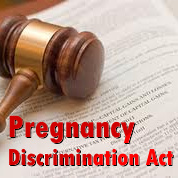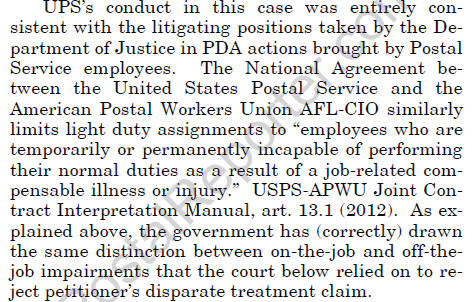 WASHINGTON (AP) — Peggy Young only has to look at her younger daughter to be reminded how long she has fought United Parcel Service over its treatment of pregnant employees, and why.
WASHINGTON (AP) — Peggy Young only has to look at her younger daughter to be reminded how long she has fought United Parcel Service over its treatment of pregnant employees, and why.
Young was pregnant with Triniti, who’s now 7 years old, when UPS told Young that she could not have a temporary assignment to avoid lifting heavy packages, as her doctor had ordered.
“They told me basically to go home and come back when I was no longer pregnant,” Young said in an interview with The Associated Press. “I couldn’t believe it.”
She sued the Atlanta-based package-delivery company for discriminating against pregnant women. She lost two rounds in lower courts, but the Supreme Court will hear her case Wednesday.
The 42-year-old Young, who lives in Lorton, Virginia, said her persistence is not only for herself. “I am fighting for my two daughters and I’m fighting for women who want to start a family and provide for the family at the same time,” she said.
UPS spokeswoman Kara Gerhardt Ross said the law is on the company’s side. “UPS did not intentionally discriminate,” Ross said.
The outcome could have wide-ranging effects.
Three-quarters of women entering the workforce today will become pregnant at least once while employed, and many will work throughout their pregnancies, employment discrimination expert Katherine Kimpel wrote in a court brief. Some will experience complications or physical effects that cause them to ask their employers for a change of duties or other modifications, Kimpel said.
Young’s case hinges on the Pregnancy Discrimination Act, a law that Congress passed in 1978 specifically to include discrimination against pregnant women as a violation of the 1964 Civil Rights Act. Congress acted after the Supreme Court, then composed entirely of men, said workplace rules that excluded pregnant workers from disability benefits and insurance coverage did not amount to sex discrimination under the landmark civil rights law.
The question in Young’s case is whether UPS violated the law through its policy of providing temporary light-duty work only to employees who had on-the-job injuries, were disabled under federal law or lost their federal driver certification. “If you were painting your house and fell off a ladder, or if you had a ski accident, that wouldn’t qualify for restricted light duty. That’s where pregnancy fell at that time. It was not covered in any state law except California’s,” Ross said.
UPS also notes in its court filings that the Postal Service, an independent agency that receives no tax dollars but is subject to congressional control, maintains an identical policy when it comes to pregnant workers. The Postal Service declined comment.
read full story
UPS in one of its briefs to the court wrote:
UPS in another brief to the court :
After throwing USPS and APWU under the bus UPS reverses it’s policy on pregnant workers:
The Equal Employment Opportunity Commission updated guidance to employers to make clear that they should accommodate people in Young’s situation.



First of all I have to ask the obvious . What year is this? I thought it was 2014, but it seems more like either 1914 or 1814. Second, I never realized pregnancy was an “illness or injury.” UPS : ” How did this injury occur and when did you become ill?” Employee: “The injury occurred when I was in bed with my husband, and I noticed the illness 2 months later.” UPS:” Sorry , you’re on your own, but if you stay, don’t think you’re having the baby on company time!” After 28 years in the USPS and having been at times a steward and officer in the APWU, I’m only aware of one instance where some nazi manager harassed a pregnant employee about restrictions. It’ really disgusting to see some “professional” executive and company go this route , and lie to do it, when I’m sure the same individual when his or her mother was pregnant made sure they had good prenatal care for both mother and child. Beware the propaganda from these companies when they talk about how wonderful they are and how they value and treat their employees with “dignity and respect”.
What is that movie , “Sleeping with the Enemy” ?
One would hope that the attorneys for the Plaintiff do their due diligence and actually read the APWU JCIM language that is quoted in UPS’ court brief. It is pretty bad when you stoop to lying on a brief.
The actual language of the JCIM cut and pasted is:
“The provisions of Article 13 govern a voluntary request for light duty work by employees
temporarily or permanently incapable of performing their normal duties as a result of
illness or injury.
LIMITED DUTY
The term “light duty” should not be confused with “limited duty.” Light duty applies to
an off-the-job illness or injury where limited duty applies to an on-the-job illness or
injury.”
I have been a Union steward for almost 20 years and can tell you that I haven’t ever seen a request for light duty turned down due to a pregnancy, except in the most severe of cases where the individual requires bed rest.
Here is the link to the APWU JCIM http://www.apwu.org/sites/apwu/files/resource-files/jcim-2012-july.pdf